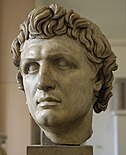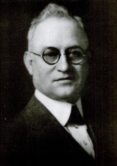Wikipedia:Main Page history/2024 March 18
From today's featured article
Attalus I (269–197 BC) ruled the Ionian Greek Pergamene Kingdom from 241 BC until his death. He won an important victory, the Battle of the Caecus River, against the Galatians, a group of migratory Celtic tribes from Thrace, who had been plundering and exacting tribute through most of Asia Minor for decades. The victory was celebrated with a triumphal monument at Pergamon (The Dying Gaul) and Attalus taking the title of king (basileus). He participated as an ally of Rome in the First and Second Macedonian Wars against Philip V of Macedon. He conducted numerous naval operations in the Aegean, gaining the island of Aegina for Pergamon during the first war and Andros during the second. Attalus styled himself as a protector of the freedoms of the Greek cities of Asia Minor and portrayed himself as the champion of Greeks against barbarians. He funded art and monuments in Pergamon and in Greek cities he sought to cultivate as allies. He died at the age of 72 and was succeeded by his son Eumenes II. (Full article...)
Did you know ...
- ... that Joseph Bosworth (pictured) was the last Republican speaker of the Kentucky House of Representatives until the election of Jeff Hoover in 2017?
- ... that Latvian-Soviet artist Karlis Johansons exhibited a skeletal tensegrity form of the Schönhardt polyhedron seven years before Erich Schönhardt's 1928 paper on its mathematics?
- ... that Walker Keith Baylor, a strong believer in phrenology and physiognomy, determined the fitness of political candidates by measuring their faces and heads with a tape measure?
- ... that names have been steadily added to a Bellingham fishermen's memorial as local fishermen are lost at sea?
- ... that Diana, Princess of Wales, drove through the night to be with Adrian Ward-Jackson before he died?
- ... that in nearly one in three clinical trials, authors engage in outcome switching, which can undermine the reliability of the trials?
- ... that Lewes Friends Meeting House, built in 1784, replaced an earlier building whose proximity to a slaughterhouse made it "unfit to sit in"?
- ... that only approximately 50 individuals have been diagnosed with Beck–Fahrner syndrome?
- ... that "runology" is the study of how to run away from China?
In the news
- In Portugal, the Democratic Alliance (leader Luís Montenegro pictured) wins the most seats in a snap legislative election.
- At the Academy Awards, Oppenheimer wins seven awards, including Best Picture.
- Japanese manga artist Akira Toriyama, author of Dragon Ball, dies at the age of 68.
- Sweden becomes the thirty-second member state of NATO.
On this day
March 18: Feast day of Saint Cyril of Jerusalem (Christianity)
- 363 – A fire began in Rome that resulted in the destruction of the Temple of Apollo Palatinus.
- 1277 – Charles I of Anjou acquired a claim on the Kingdom of Jerusalem in exchange for a significant sum of money.
- 1906 – Romanian inventor Traian Vuia became the first person to fly a heavier-than-air monoplane (pictured) with an unassisted takeoff.
- 1959 – Tibetan uprising: After the 14th Dalai Lama sought refuge at Sera Monastery in Lhasa, Tibet, Chinese forces bombarded the monastery, inflicting severe destruction and killing hundreds of Buddhist monks.
- 1977 – The punk group the Clash released their first single, "White Riot", described as their "most controversial song" due to its lyrics about class economics and race.
- 2019 – Syrian civil war: The U.S. Air Force carried out an airstrike in al-Baghuz Fawqani, killing 64 civilians.
- Edward the Martyr (d. 978)
- Clem Hill (b. 1877)
- Johnny Papalia (b. 1924)
- Wali Mohammad Itoo (d. 1994)
From today's featured list
1952 in spaceflight featured several branches of the United States' military, often in partnership with civilian organizations, continuing their programs of sounding rocket research beyond the 100-kilometre (62-mile) boundary of space (as defined by the World Air Sports Federation) using the Aerobee rocket. The University of Iowa launched its first series of rockoon flights, demonstrating the validity of the balloon-launched rocket, a comparatively inexpensive way to explore the upper atmosphere. The launch of Viking 9 (pictured) at the end of the year to an altitude of 135 miles (217 kilometres), by the Naval Research Laboratory team under the management of Milton Rosen, represented the pinnacle of contemporary operational rocket design. The same year, groundwork was laid for the launch of the first artificial satellite when, in October, the General Assembly of the International Council of Scientific Unions (ICSU) scheduled the International Geophysical Year for 1957–58. (Full list...)
Today's featured picture

|
Acanthite is a form of silver sulfide with the chemical formula Ag2S. It was first described in 1855 for an occurrence in the Ore Mountains in the present-day Czech Republic. The name is derived from the Greek "akantha" meaning thorn or arrow, in reference to its crystal shape. Acanthite crystallizes in the monoclinic system and is the stable form of silver sulfide below 173 °C (343 °F). As argentite cools below that temperature, its cubic form is distorted to the monoclinic form of acanthite. This crystal of acanthite, with dimensions of 4.0 cm × 2.5 cm × 1.5 cm (1.57 in × 0.98 in × 0.59 in), was extracted from a mine in Imider, in the Jbel Saghro, a mountain range in Morocco. This photograph has been focus-stacked from 42 separate images. Photograph credit: Ivar Leidus
Recently featured:
|
Other areas of Wikipedia
- Community portal – The central hub for editors, with resources, links, tasks, and announcements.
- Village pump – Forum for discussions about Wikipedia itself, including policies and technical issues.
- Site news – Sources of news about Wikipedia and the broader Wikimedia movement.
- Teahouse – Ask basic questions about using or editing Wikipedia.
- Help desk – Ask questions about using or editing Wikipedia.
- Reference desk – Ask research questions about encyclopedic topics.
- Content portals – A unique way to navigate the encyclopedia.
Wikipedia's sister projects
Wikipedia is written by volunteer editors and hosted by the Wikimedia Foundation, a non-profit organization that also hosts a range of other volunteer projects:
-
Commons
Free media repository -
MediaWiki
Wiki software development -
Meta-Wiki
Wikimedia project coordination -
Wikibooks
Free textbooks and manuals -
Wikidata
Free knowledge base -
Wikinews
Free-content news -
Wikiquote
Collection of quotations -
Wikisource
Free-content library -
Wikispecies
Directory of species -
Wikiversity
Free learning tools -
Wikivoyage
Free travel guide -
Wiktionary
Dictionary and thesaurus
Wikipedia languages
This Wikipedia is written in English. Many other Wikipedias are available; some of the largest are listed below.
-
1,000,000+ articles
-
250,000+ articles
-
50,000+ articles





